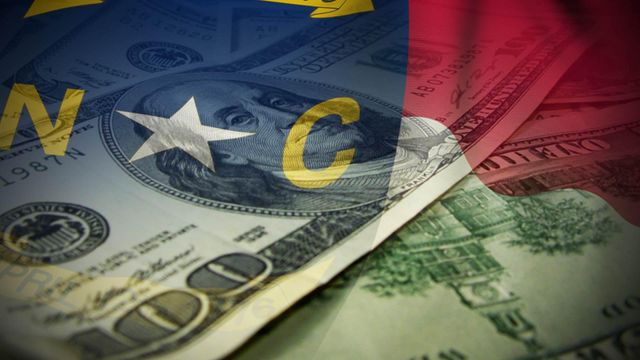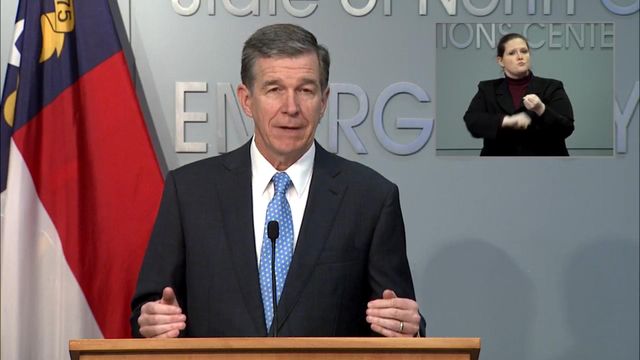Raises, bonuses for teachers, state workers in Cooper's budget plan
Gov. Roy Cooper on Wednesday proposed a $27.3 billion spending plan for North Carolina's coming budget year, including hefty raises for teachers, smaller raises for state employees and several rounds of bonuses for both groups.
Posted — UpdatedCooper again pressed for expanding Medicaid coverage to hundreds of thousands of low-income working adults, an idea that has led to frequent clashes with Republican legislative leaders and has help scuttle budget agreements in each of the last two years. But he said he's confident things will be different this time around.
"Unlike the last budget cycle we had, I've had numerous conversations with both Republican and Democratic leadership [in the General Assembly]," he said during a news conference. "We've all agreed that everything is on the table – everything is up for negotiation."
The governor noted that the coronavirus pandemic has changed the calculus of providing taxpayer-funded health coverage to more people. Thousands have lost their jobs and their employer-provided health coverage over the past year, and the federal government's latest aid package provides even more funding to cover Medicaid costs, he said. In addition, North Carolina's years-long effort to turn Medicaid into a managed care program to control costs will take effect in July, he said.
"Red states across the country are already making moves. I'm ready to work with legislative leadership and both political parties here in North Carolina to find a way forward," Cooper said.
But Republican legislative leaders immediately expressed concern over the budget, without even getting into the Medicaid issue.
"We have concerns about the very high spending growth and billions in borrowing in Gov. Cooper's proposed budget," Sen. Brent Jackson, R-Sampson, one of the Senate's budget writers, said in a statement. "We don’t want to return to an era of rollercoaster-style budgets, with huge spikes in the boom years followed by huge cuts in the lean years."
"While there are a number of shared priorities funded in the governor’s budget proposal, North Carolina lawmakers will remain vigilant in our responsible financial management of the state and avoid irresponsible decisions that have harmed taxpayers in the past," House Speaker Tim Moore said in a statement.
"This is the time to find opportunity in crisis," he said. "With the right priorities, we'll not only beat this pandemic, but build lasting success for North Carolina."
As usual, education spending accounts for the bulk of the proposed budget, and Cooper called for an additional $840 million for schools, community colleges and the University of North Carolina system.
He proposed 10 percent raises for K-12 educators over the next two years and 7.5 percent pay increases over that period for school bus drivers, custodians and other non-certified personnel. Staff at UNC campuses and community colleges also would be in line for 7.5 percent raises over the next two years.
Public school teachers also would get a $2,000 bonus in May, and they, other education personnel at all levels and state employees would get $1,000 bonuses in October and again in October 2022.
In addition to the bonuses, state workers would get 5 percent raises over the next two years under the proposed budget, while state retirees would get annual 2 percent cost-of-living adjustments and 2 percent bonuses.
"We have to invest in our human capital – our people," Cooper said.
Other highlights of the spending plan include the following:
- A $15-an-hour minimum wage for state workers
- Restoration of the state Earned Income Tax Credit and a new child care tax credit
- $1.1 billion for infrastructure projects, with more than half going to the UNC system
- $120 million to hire an additional 1,000 school counselors and nurses
- Funding for another 1,500 slots in the state's pre-kindergarten program
- $328 million for large-scale information technology projects
- $100 million to support clean energy initiatives
- $48 million in pay supplements to recruit and retain correctional officers
- $10 million for testing sex assault evidence kits
- $7.7 million for mitigation of GenX and other emerging chemical compounds
In addition to the $1.1 billion earmarked for infrastructure, Cooper reiterated his interest in putting a major bond package on the ballot this fall for voter approval – even if local elections are delayed.
He proposed a $4.7 billion bond, with $2.5 billion to pay for projects at K-12 schools, $783 million at UNC campuses, $500 million at community colleges, $439 million at state parks and museums and $430 million health and safety upgrades at various state facilities.
"Interest rates have never been lower, and our economy needs the boost," he said, noting that the state recently obtained a 1.48 percent interest rate on bonds issued for road projects.
The state Senate has balked at major bond packages in recent years, preferring a pay-as-you-go approach. But Cooper said both approaches could be used, with the $1.1 billion in his proposed budget for smaller projects and bond money for longer-term projects that wouldn't rely on the whims of future legislatures.
"I think we all agree that we need to help build public schools," he said, noting surveys of school districts statewide have shown $8 billion in needed construction and renovations. "A lot of counties simply cannot afford to do it."
• Credits
Copyright 2024 by Capitol Broadcasting Company. All rights reserved. This material may not be published, broadcast, rewritten or redistributed.






